Critical Issues in Education: Poverty's Negative Impact on Early Childhood Development
VerifiedAdded on 2023/06/08
|12
|3780
|446
AI Summary
This report explores the critical issue of poverty and its negative impact on early childhood development in education. It critiques two articles that highlight the impact of poverty on children's learning and development. The report discusses how poverty affects children physically, socially, emotionally, and cognitively, and how it creates a vicious cycle of poverty. It also examines government policies and initiatives aimed at eradicating education inequalities resulting from poverty.
Contribute Materials
Your contribution can guide someone’s learning journey. Share your
documents today.
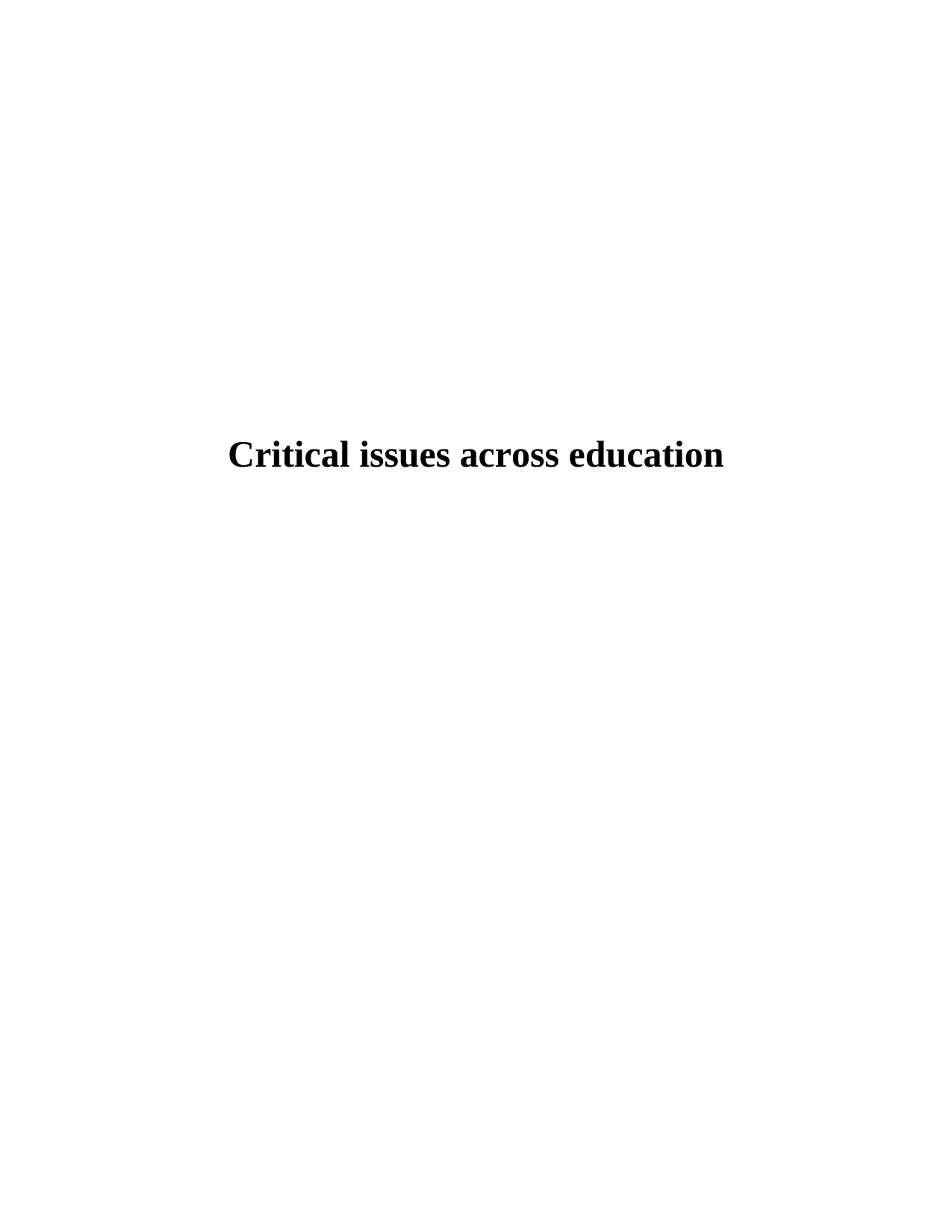
Critical issues across education
Secure Best Marks with AI Grader
Need help grading? Try our AI Grader for instant feedback on your assignments.
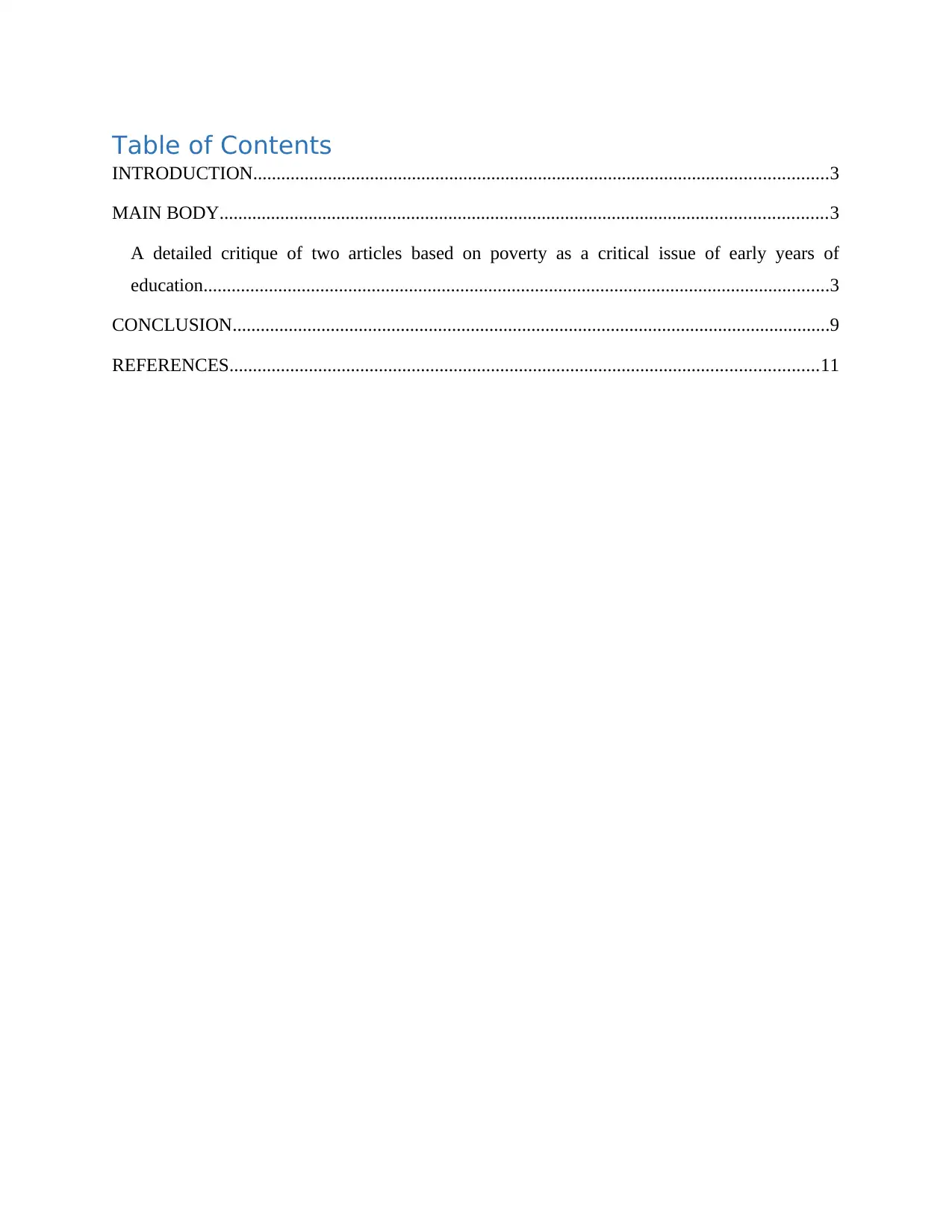
Table of Contents
INTRODUCTION...........................................................................................................................3
MAIN BODY..................................................................................................................................3
A detailed critique of two articles based on poverty as a critical issue of early years of
education......................................................................................................................................3
CONCLUSION................................................................................................................................9
REFERENCES..............................................................................................................................11
INTRODUCTION...........................................................................................................................3
MAIN BODY..................................................................................................................................3
A detailed critique of two articles based on poverty as a critical issue of early years of
education......................................................................................................................................3
CONCLUSION................................................................................................................................9
REFERENCES..............................................................................................................................11
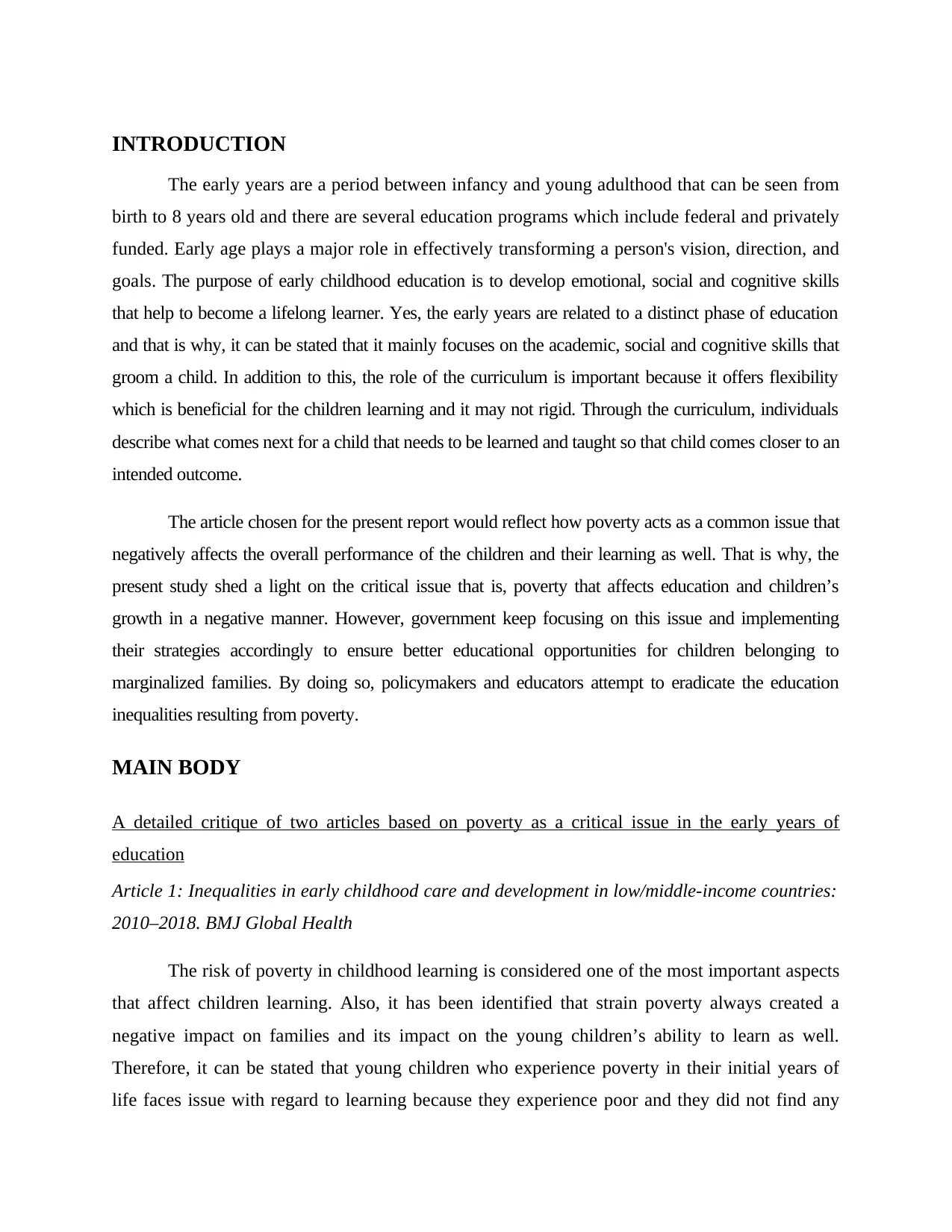
INTRODUCTION
The early years are a period between infancy and young adulthood that can be seen from
birth to 8 years old and there are several education programs which include federal and privately
funded. Early age plays a major role in effectively transforming a person's vision, direction, and
goals. The purpose of early childhood education is to develop emotional, social and cognitive skills
that help to become a lifelong learner. Yes, the early years are related to a distinct phase of education
and that is why, it can be stated that it mainly focuses on the academic, social and cognitive skills that
groom a child. In addition to this, the role of the curriculum is important because it offers flexibility
which is beneficial for the children learning and it may not rigid. Through the curriculum, individuals
describe what comes next for a child that needs to be learned and taught so that child comes closer to an
intended outcome.
The article chosen for the present report would reflect how poverty acts as a common issue that
negatively affects the overall performance of the children and their learning as well. That is why, the
present study shed a light on the critical issue that is, poverty that affects education and children’s
growth in a negative manner. However, government keep focusing on this issue and implementing
their strategies accordingly to ensure better educational opportunities for children belonging to
marginalized families. By doing so, policymakers and educators attempt to eradicate the education
inequalities resulting from poverty.
MAIN BODY
A detailed critique of two articles based on poverty as a critical issue in the early years of
education
Article 1: Inequalities in early childhood care and development in low/middle-income countries:
2010–2018. BMJ Global Health
The risk of poverty in childhood learning is considered one of the most important aspects
that affect children learning. Also, it has been identified that strain poverty always created a
negative impact on families and its impact on the young children’s ability to learn as well.
Therefore, it can be stated that young children who experience poverty in their initial years of
life faces issue with regard to learning because they experience poor and they did not find any
The early years are a period between infancy and young adulthood that can be seen from
birth to 8 years old and there are several education programs which include federal and privately
funded. Early age plays a major role in effectively transforming a person's vision, direction, and
goals. The purpose of early childhood education is to develop emotional, social and cognitive skills
that help to become a lifelong learner. Yes, the early years are related to a distinct phase of education
and that is why, it can be stated that it mainly focuses on the academic, social and cognitive skills that
groom a child. In addition to this, the role of the curriculum is important because it offers flexibility
which is beneficial for the children learning and it may not rigid. Through the curriculum, individuals
describe what comes next for a child that needs to be learned and taught so that child comes closer to an
intended outcome.
The article chosen for the present report would reflect how poverty acts as a common issue that
negatively affects the overall performance of the children and their learning as well. That is why, the
present study shed a light on the critical issue that is, poverty that affects education and children’s
growth in a negative manner. However, government keep focusing on this issue and implementing
their strategies accordingly to ensure better educational opportunities for children belonging to
marginalized families. By doing so, policymakers and educators attempt to eradicate the education
inequalities resulting from poverty.
MAIN BODY
A detailed critique of two articles based on poverty as a critical issue in the early years of
education
Article 1: Inequalities in early childhood care and development in low/middle-income countries:
2010–2018. BMJ Global Health
The risk of poverty in childhood learning is considered one of the most important aspects
that affect children learning. Also, it has been identified that strain poverty always created a
negative impact on families and its impact on the young children’s ability to learn as well.
Therefore, it can be stated that young children who experience poverty in their initial years of
life faces issue with regard to learning because they experience poor and they did not find any
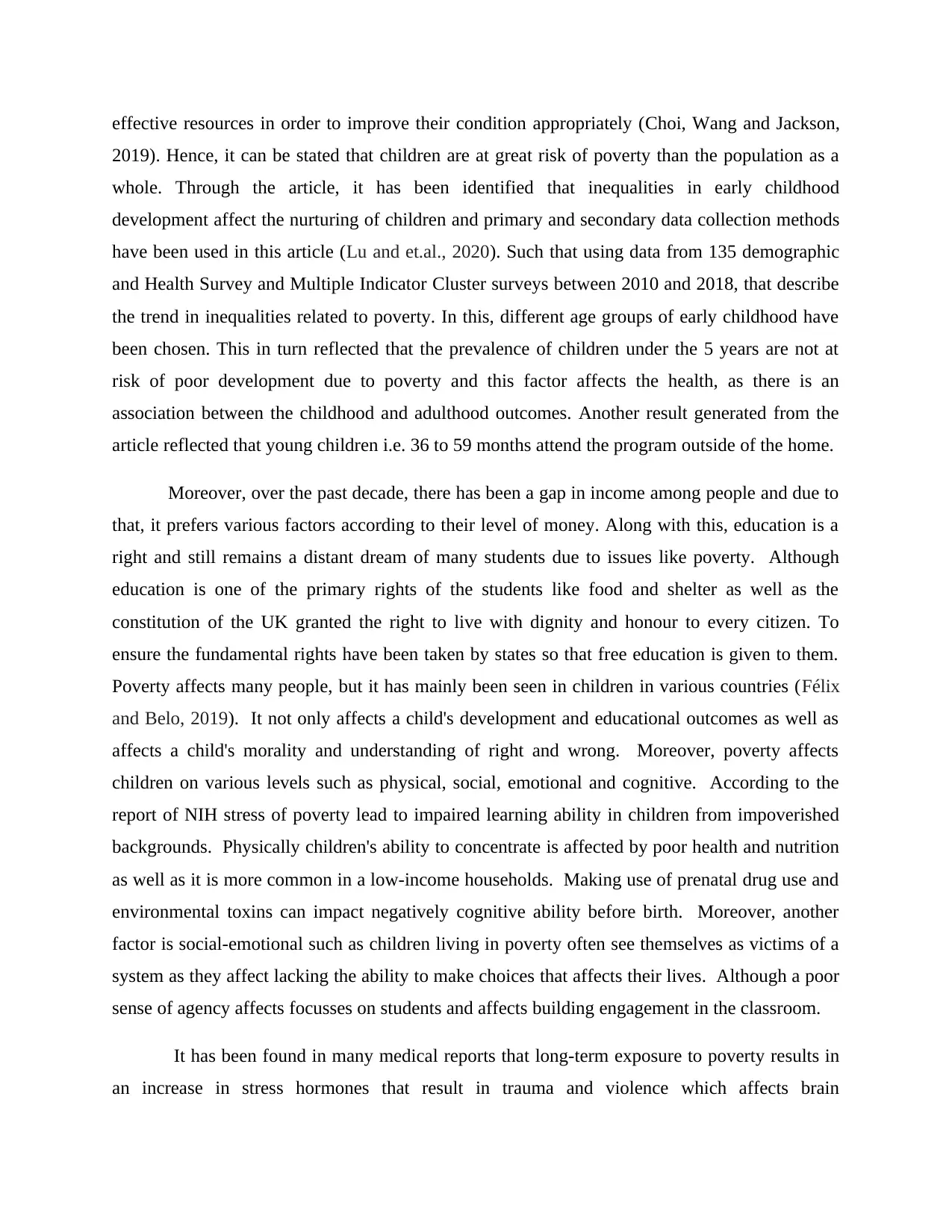
effective resources in order to improve their condition appropriately (Choi, Wang and Jackson,
2019). Hence, it can be stated that children are at great risk of poverty than the population as a
whole. Through the article, it has been identified that inequalities in early childhood
development affect the nurturing of children and primary and secondary data collection methods
have been used in this article (Lu and et.al., 2020). Such that using data from 135 demographic
and Health Survey and Multiple Indicator Cluster surveys between 2010 and 2018, that describe
the trend in inequalities related to poverty. In this, different age groups of early childhood have
been chosen. This in turn reflected that the prevalence of children under the 5 years are not at
risk of poor development due to poverty and this factor affects the health, as there is an
association between the childhood and adulthood outcomes. Another result generated from the
article reflected that young children i.e. 36 to 59 months attend the program outside of the home.
Moreover, over the past decade, there has been a gap in income among people and due to
that, it prefers various factors according to their level of money. Along with this, education is a
right and still remains a distant dream of many students due to issues like poverty. Although
education is one of the primary rights of the students like food and shelter as well as the
constitution of the UK granted the right to live with dignity and honour to every citizen. To
ensure the fundamental rights have been taken by states so that free education is given to them.
Poverty affects many people, but it has mainly been seen in children in various countries (Félix
and Belo, 2019). It not only affects a child's development and educational outcomes as well as
affects a child's morality and understanding of right and wrong. Moreover, poverty affects
children on various levels such as physical, social, emotional and cognitive. According to the
report of NIH stress of poverty lead to impaired learning ability in children from impoverished
backgrounds. Physically children's ability to concentrate is affected by poor health and nutrition
as well as it is more common in a low-income households. Making use of prenatal drug use and
environmental toxins can impact negatively cognitive ability before birth. Moreover, another
factor is social-emotional such as children living in poverty often see themselves as victims of a
system as they affect lacking the ability to make choices that affects their lives. Although a poor
sense of agency affects focusses on students and affects building engagement in the classroom.
It has been found in many medical reports that long-term exposure to poverty results in
an increase in stress hormones that result in trauma and violence which affects brain
2019). Hence, it can be stated that children are at great risk of poverty than the population as a
whole. Through the article, it has been identified that inequalities in early childhood
development affect the nurturing of children and primary and secondary data collection methods
have been used in this article (Lu and et.al., 2020). Such that using data from 135 demographic
and Health Survey and Multiple Indicator Cluster surveys between 2010 and 2018, that describe
the trend in inequalities related to poverty. In this, different age groups of early childhood have
been chosen. This in turn reflected that the prevalence of children under the 5 years are not at
risk of poor development due to poverty and this factor affects the health, as there is an
association between the childhood and adulthood outcomes. Another result generated from the
article reflected that young children i.e. 36 to 59 months attend the program outside of the home.
Moreover, over the past decade, there has been a gap in income among people and due to
that, it prefers various factors according to their level of money. Along with this, education is a
right and still remains a distant dream of many students due to issues like poverty. Although
education is one of the primary rights of the students like food and shelter as well as the
constitution of the UK granted the right to live with dignity and honour to every citizen. To
ensure the fundamental rights have been taken by states so that free education is given to them.
Poverty affects many people, but it has mainly been seen in children in various countries (Félix
and Belo, 2019). It not only affects a child's development and educational outcomes as well as
affects a child's morality and understanding of right and wrong. Moreover, poverty affects
children on various levels such as physical, social, emotional and cognitive. According to the
report of NIH stress of poverty lead to impaired learning ability in children from impoverished
backgrounds. Physically children's ability to concentrate is affected by poor health and nutrition
as well as it is more common in a low-income households. Making use of prenatal drug use and
environmental toxins can impact negatively cognitive ability before birth. Moreover, another
factor is social-emotional such as children living in poverty often see themselves as victims of a
system as they affect lacking the ability to make choices that affects their lives. Although a poor
sense of agency affects focusses on students and affects building engagement in the classroom.
It has been found in many medical reports that long-term exposure to poverty results in
an increase in stress hormones that result in trauma and violence which affects brain
Secure Best Marks with AI Grader
Need help grading? Try our AI Grader for instant feedback on your assignments.
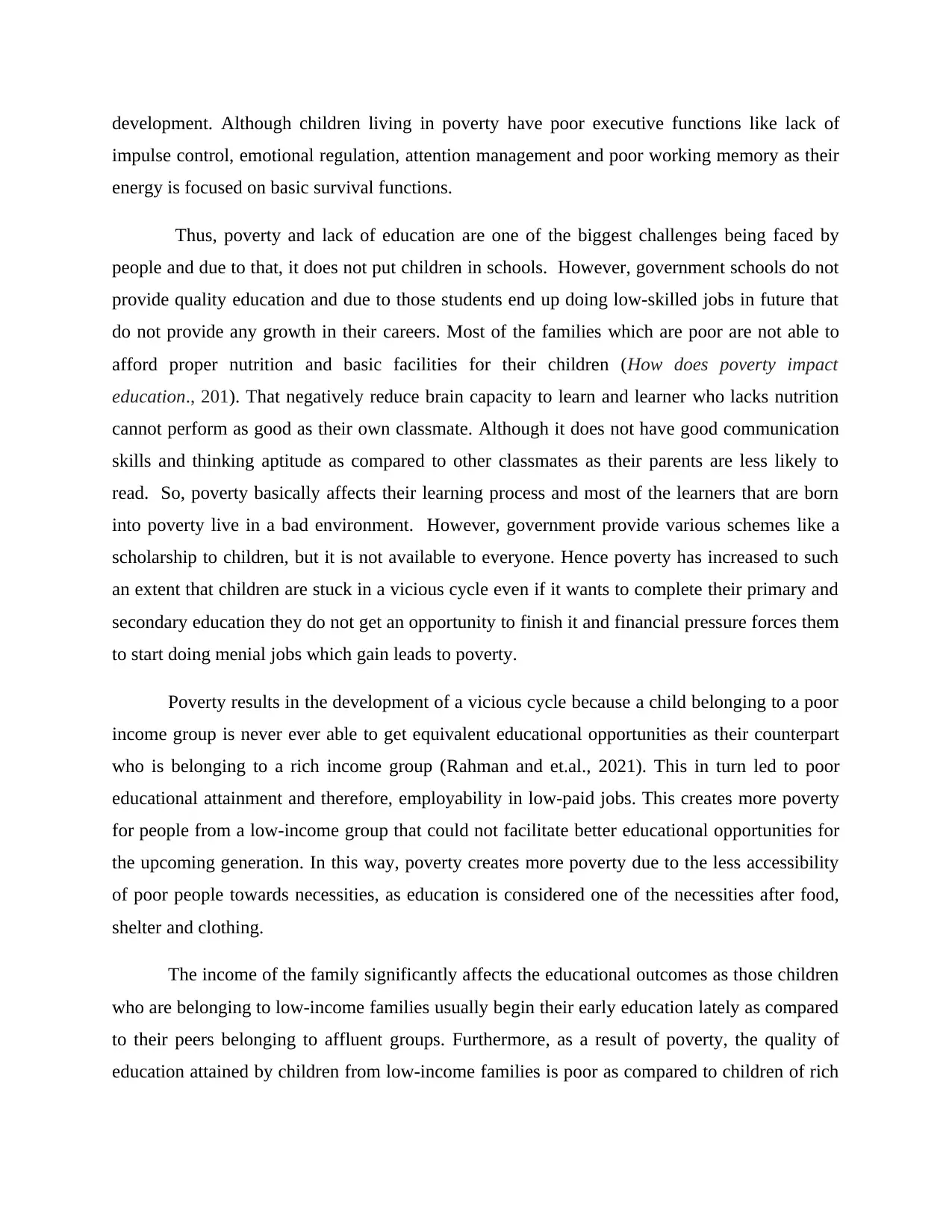
development. Although children living in poverty have poor executive functions like lack of
impulse control, emotional regulation, attention management and poor working memory as their
energy is focused on basic survival functions.
Thus, poverty and lack of education are one of the biggest challenges being faced by
people and due to that, it does not put children in schools. However, government schools do not
provide quality education and due to those students end up doing low-skilled jobs in future that
do not provide any growth in their careers. Most of the families which are poor are not able to
afford proper nutrition and basic facilities for their children (How does poverty impact
education., 201). That negatively reduce brain capacity to learn and learner who lacks nutrition
cannot perform as good as their own classmate. Although it does not have good communication
skills and thinking aptitude as compared to other classmates as their parents are less likely to
read. So, poverty basically affects their learning process and most of the learners that are born
into poverty live in a bad environment. However, government provide various schemes like a
scholarship to children, but it is not available to everyone. Hence poverty has increased to such
an extent that children are stuck in a vicious cycle even if it wants to complete their primary and
secondary education they do not get an opportunity to finish it and financial pressure forces them
to start doing menial jobs which gain leads to poverty.
Poverty results in the development of a vicious cycle because a child belonging to a poor
income group is never ever able to get equivalent educational opportunities as their counterpart
who is belonging to a rich income group (Rahman and et.al., 2021). This in turn led to poor
educational attainment and therefore, employability in low-paid jobs. This creates more poverty
for people from a low-income group that could not facilitate better educational opportunities for
the upcoming generation. In this way, poverty creates more poverty due to the less accessibility
of poor people towards necessities, as education is considered one of the necessities after food,
shelter and clothing.
The income of the family significantly affects the educational outcomes as those children
who are belonging to low-income families usually begin their early education lately as compared
to their peers belonging to affluent groups. Furthermore, as a result of poverty, the quality of
education attained by children from low-income families is poor as compared to children of rich
impulse control, emotional regulation, attention management and poor working memory as their
energy is focused on basic survival functions.
Thus, poverty and lack of education are one of the biggest challenges being faced by
people and due to that, it does not put children in schools. However, government schools do not
provide quality education and due to those students end up doing low-skilled jobs in future that
do not provide any growth in their careers. Most of the families which are poor are not able to
afford proper nutrition and basic facilities for their children (How does poverty impact
education., 201). That negatively reduce brain capacity to learn and learner who lacks nutrition
cannot perform as good as their own classmate. Although it does not have good communication
skills and thinking aptitude as compared to other classmates as their parents are less likely to
read. So, poverty basically affects their learning process and most of the learners that are born
into poverty live in a bad environment. However, government provide various schemes like a
scholarship to children, but it is not available to everyone. Hence poverty has increased to such
an extent that children are stuck in a vicious cycle even if it wants to complete their primary and
secondary education they do not get an opportunity to finish it and financial pressure forces them
to start doing menial jobs which gain leads to poverty.
Poverty results in the development of a vicious cycle because a child belonging to a poor
income group is never ever able to get equivalent educational opportunities as their counterpart
who is belonging to a rich income group (Rahman and et.al., 2021). This in turn led to poor
educational attainment and therefore, employability in low-paid jobs. This creates more poverty
for people from a low-income group that could not facilitate better educational opportunities for
the upcoming generation. In this way, poverty creates more poverty due to the less accessibility
of poor people towards necessities, as education is considered one of the necessities after food,
shelter and clothing.
The income of the family significantly affects the educational outcomes as those children
who are belonging to low-income families usually begin their early education lately as compared
to their peers belonging to affluent groups. Furthermore, as a result of poverty, the quality of
education attained by children from low-income families is poor as compared to children of rich
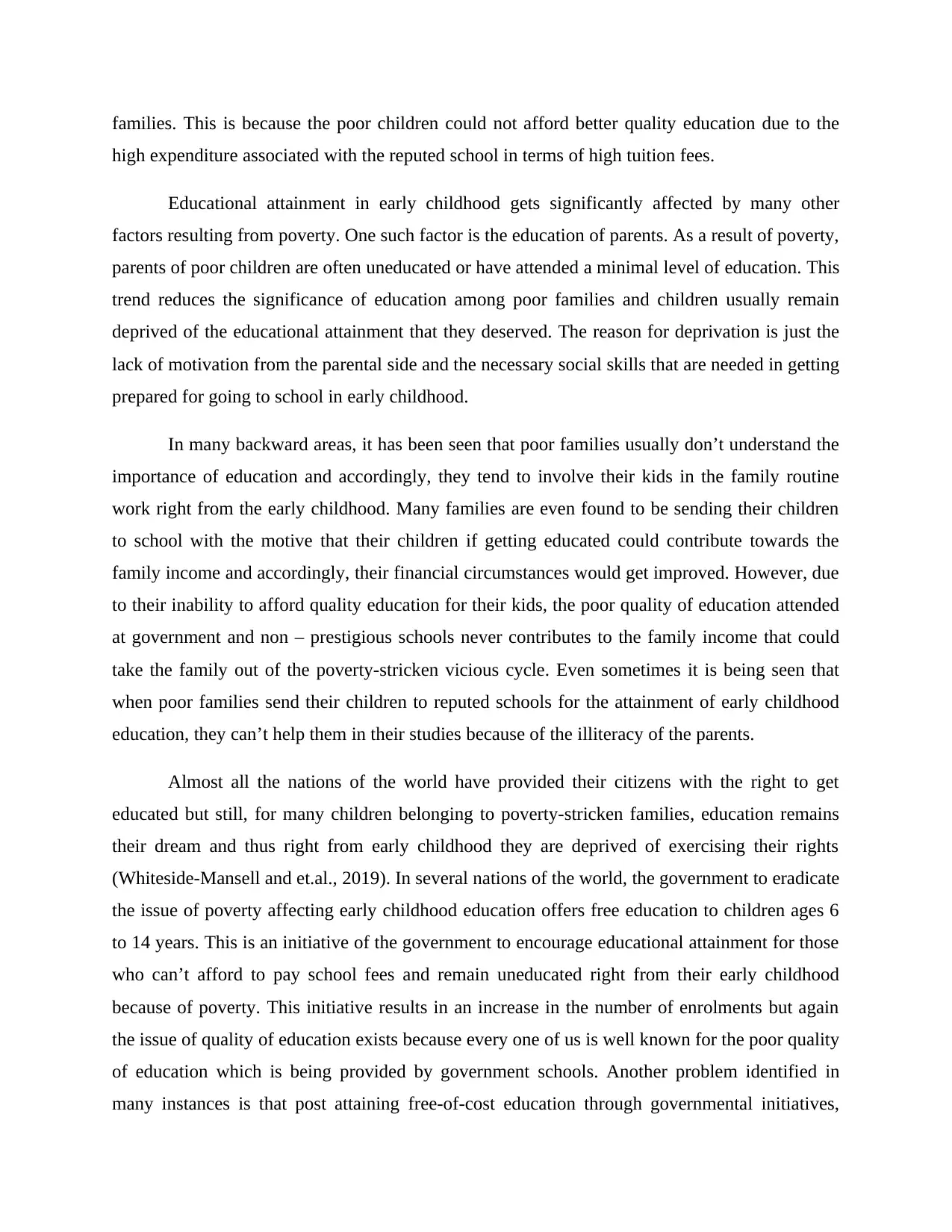
families. This is because the poor children could not afford better quality education due to the
high expenditure associated with the reputed school in terms of high tuition fees.
Educational attainment in early childhood gets significantly affected by many other
factors resulting from poverty. One such factor is the education of parents. As a result of poverty,
parents of poor children are often uneducated or have attended a minimal level of education. This
trend reduces the significance of education among poor families and children usually remain
deprived of the educational attainment that they deserved. The reason for deprivation is just the
lack of motivation from the parental side and the necessary social skills that are needed in getting
prepared for going to school in early childhood.
In many backward areas, it has been seen that poor families usually don’t understand the
importance of education and accordingly, they tend to involve their kids in the family routine
work right from the early childhood. Many families are even found to be sending their children
to school with the motive that their children if getting educated could contribute towards the
family income and accordingly, their financial circumstances would get improved. However, due
to their inability to afford quality education for their kids, the poor quality of education attended
at government and non – prestigious schools never contributes to the family income that could
take the family out of the poverty-stricken vicious cycle. Even sometimes it is being seen that
when poor families send their children to reputed schools for the attainment of early childhood
education, they can’t help them in their studies because of the illiteracy of the parents.
Almost all the nations of the world have provided their citizens with the right to get
educated but still, for many children belonging to poverty-stricken families, education remains
their dream and thus right from early childhood they are deprived of exercising their rights
(Whiteside-Mansell and et.al., 2019). In several nations of the world, the government to eradicate
the issue of poverty affecting early childhood education offers free education to children ages 6
to 14 years. This is an initiative of the government to encourage educational attainment for those
who can’t afford to pay school fees and remain uneducated right from their early childhood
because of poverty. This initiative results in an increase in the number of enrolments but again
the issue of quality of education exists because every one of us is well known for the poor quality
of education which is being provided by government schools. Another problem identified in
many instances is that post attaining free-of-cost education through governmental initiatives,
high expenditure associated with the reputed school in terms of high tuition fees.
Educational attainment in early childhood gets significantly affected by many other
factors resulting from poverty. One such factor is the education of parents. As a result of poverty,
parents of poor children are often uneducated or have attended a minimal level of education. This
trend reduces the significance of education among poor families and children usually remain
deprived of the educational attainment that they deserved. The reason for deprivation is just the
lack of motivation from the parental side and the necessary social skills that are needed in getting
prepared for going to school in early childhood.
In many backward areas, it has been seen that poor families usually don’t understand the
importance of education and accordingly, they tend to involve their kids in the family routine
work right from the early childhood. Many families are even found to be sending their children
to school with the motive that their children if getting educated could contribute towards the
family income and accordingly, their financial circumstances would get improved. However, due
to their inability to afford quality education for their kids, the poor quality of education attended
at government and non – prestigious schools never contributes to the family income that could
take the family out of the poverty-stricken vicious cycle. Even sometimes it is being seen that
when poor families send their children to reputed schools for the attainment of early childhood
education, they can’t help them in their studies because of the illiteracy of the parents.
Almost all the nations of the world have provided their citizens with the right to get
educated but still, for many children belonging to poverty-stricken families, education remains
their dream and thus right from early childhood they are deprived of exercising their rights
(Whiteside-Mansell and et.al., 2019). In several nations of the world, the government to eradicate
the issue of poverty affecting early childhood education offers free education to children ages 6
to 14 years. This is an initiative of the government to encourage educational attainment for those
who can’t afford to pay school fees and remain uneducated right from their early childhood
because of poverty. This initiative results in an increase in the number of enrolments but again
the issue of quality of education exists because every one of us is well known for the poor quality
of education which is being provided by government schools. Another problem identified in
many instances is that post attaining free-of-cost education through governmental initiatives,
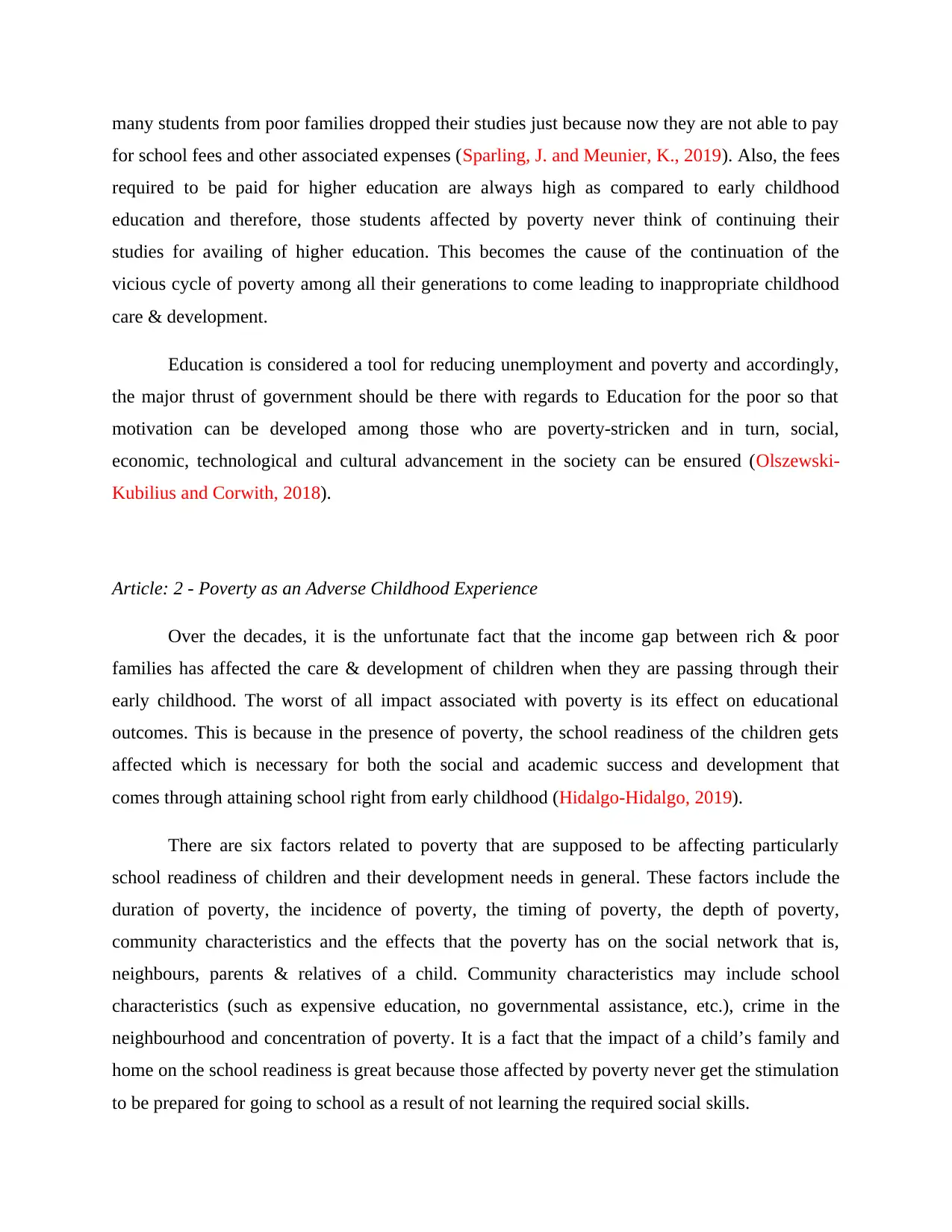
many students from poor families dropped their studies just because now they are not able to pay
for school fees and other associated expenses (Sparling, J. and Meunier, K., 2019). Also, the fees
required to be paid for higher education are always high as compared to early childhood
education and therefore, those students affected by poverty never think of continuing their
studies for availing of higher education. This becomes the cause of the continuation of the
vicious cycle of poverty among all their generations to come leading to inappropriate childhood
care & development.
Education is considered a tool for reducing unemployment and poverty and accordingly,
the major thrust of government should be there with regards to Education for the poor so that
motivation can be developed among those who are poverty-stricken and in turn, social,
economic, technological and cultural advancement in the society can be ensured (Olszewski-
Kubilius and Corwith, 2018).
Article: 2 - Poverty as an Adverse Childhood Experience
Over the decades, it is the unfortunate fact that the income gap between rich & poor
families has affected the care & development of children when they are passing through their
early childhood. The worst of all impact associated with poverty is its effect on educational
outcomes. This is because in the presence of poverty, the school readiness of the children gets
affected which is necessary for both the social and academic success and development that
comes through attaining school right from early childhood (Hidalgo-Hidalgo, 2019).
There are six factors related to poverty that are supposed to be affecting particularly
school readiness of children and their development needs in general. These factors include the
duration of poverty, the incidence of poverty, the timing of poverty, the depth of poverty,
community characteristics and the effects that the poverty has on the social network that is,
neighbours, parents & relatives of a child. Community characteristics may include school
characteristics (such as expensive education, no governmental assistance, etc.), crime in the
neighbourhood and concentration of poverty. It is a fact that the impact of a child’s family and
home on the school readiness is great because those affected by poverty never get the stimulation
to be prepared for going to school as a result of not learning the required social skills.
for school fees and other associated expenses (Sparling, J. and Meunier, K., 2019). Also, the fees
required to be paid for higher education are always high as compared to early childhood
education and therefore, those students affected by poverty never think of continuing their
studies for availing of higher education. This becomes the cause of the continuation of the
vicious cycle of poverty among all their generations to come leading to inappropriate childhood
care & development.
Education is considered a tool for reducing unemployment and poverty and accordingly,
the major thrust of government should be there with regards to Education for the poor so that
motivation can be developed among those who are poverty-stricken and in turn, social,
economic, technological and cultural advancement in the society can be ensured (Olszewski-
Kubilius and Corwith, 2018).
Article: 2 - Poverty as an Adverse Childhood Experience
Over the decades, it is the unfortunate fact that the income gap between rich & poor
families has affected the care & development of children when they are passing through their
early childhood. The worst of all impact associated with poverty is its effect on educational
outcomes. This is because in the presence of poverty, the school readiness of the children gets
affected which is necessary for both the social and academic success and development that
comes through attaining school right from early childhood (Hidalgo-Hidalgo, 2019).
There are six factors related to poverty that are supposed to be affecting particularly
school readiness of children and their development needs in general. These factors include the
duration of poverty, the incidence of poverty, the timing of poverty, the depth of poverty,
community characteristics and the effects that the poverty has on the social network that is,
neighbours, parents & relatives of a child. Community characteristics may include school
characteristics (such as expensive education, no governmental assistance, etc.), crime in the
neighbourhood and concentration of poverty. It is a fact that the impact of a child’s family and
home on the school readiness is great because those affected by poverty never get the stimulation
to be prepared for going to school as a result of not learning the required social skills.
Paraphrase This Document
Need a fresh take? Get an instant paraphrase of this document with our AI Paraphraser
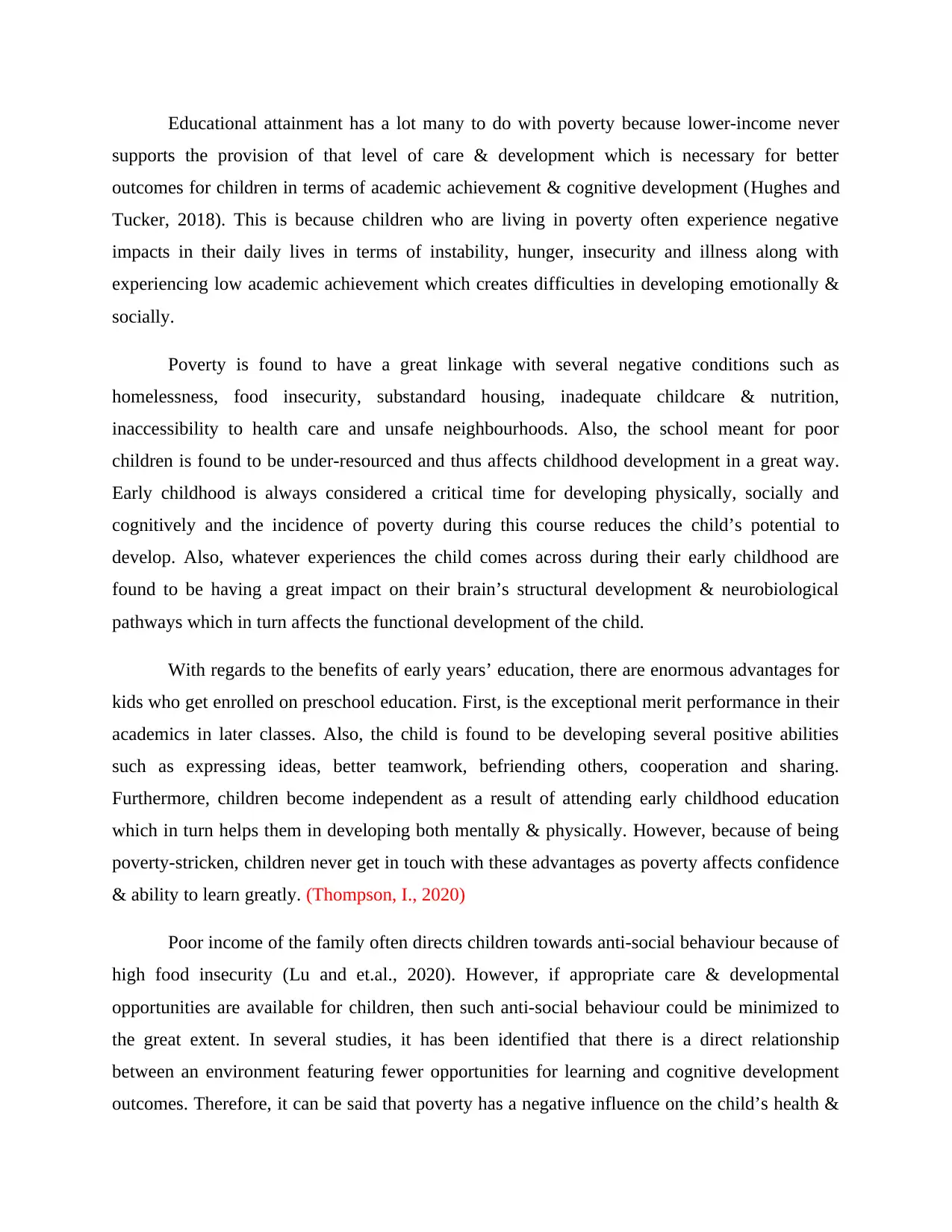
Educational attainment has a lot many to do with poverty because lower-income never
supports the provision of that level of care & development which is necessary for better
outcomes for children in terms of academic achievement & cognitive development (Hughes and
Tucker, 2018). This is because children who are living in poverty often experience negative
impacts in their daily lives in terms of instability, hunger, insecurity and illness along with
experiencing low academic achievement which creates difficulties in developing emotionally &
socially.
Poverty is found to have a great linkage with several negative conditions such as
homelessness, food insecurity, substandard housing, inadequate childcare & nutrition,
inaccessibility to health care and unsafe neighbourhoods. Also, the school meant for poor
children is found to be under-resourced and thus affects childhood development in a great way.
Early childhood is always considered a critical time for developing physically, socially and
cognitively and the incidence of poverty during this course reduces the child’s potential to
develop. Also, whatever experiences the child comes across during their early childhood are
found to be having a great impact on their brain’s structural development & neurobiological
pathways which in turn affects the functional development of the child.
With regards to the benefits of early years’ education, there are enormous advantages for
kids who get enrolled on preschool education. First, is the exceptional merit performance in their
academics in later classes. Also, the child is found to be developing several positive abilities
such as expressing ideas, better teamwork, befriending others, cooperation and sharing.
Furthermore, children become independent as a result of attending early childhood education
which in turn helps them in developing both mentally & physically. However, because of being
poverty-stricken, children never get in touch with these advantages as poverty affects confidence
& ability to learn greatly. (Thompson, I., 2020)
Poor income of the family often directs children towards anti-social behaviour because of
high food insecurity (Lu and et.al., 2020). However, if appropriate care & developmental
opportunities are available for children, then such anti-social behaviour could be minimized to
the great extent. In several studies, it has been identified that there is a direct relationship
between an environment featuring fewer opportunities for learning and cognitive development
outcomes. Therefore, it can be said that poverty has a negative influence on the child’s health &
supports the provision of that level of care & development which is necessary for better
outcomes for children in terms of academic achievement & cognitive development (Hughes and
Tucker, 2018). This is because children who are living in poverty often experience negative
impacts in their daily lives in terms of instability, hunger, insecurity and illness along with
experiencing low academic achievement which creates difficulties in developing emotionally &
socially.
Poverty is found to have a great linkage with several negative conditions such as
homelessness, food insecurity, substandard housing, inadequate childcare & nutrition,
inaccessibility to health care and unsafe neighbourhoods. Also, the school meant for poor
children is found to be under-resourced and thus affects childhood development in a great way.
Early childhood is always considered a critical time for developing physically, socially and
cognitively and the incidence of poverty during this course reduces the child’s potential to
develop. Also, whatever experiences the child comes across during their early childhood are
found to be having a great impact on their brain’s structural development & neurobiological
pathways which in turn affects the functional development of the child.
With regards to the benefits of early years’ education, there are enormous advantages for
kids who get enrolled on preschool education. First, is the exceptional merit performance in their
academics in later classes. Also, the child is found to be developing several positive abilities
such as expressing ideas, better teamwork, befriending others, cooperation and sharing.
Furthermore, children become independent as a result of attending early childhood education
which in turn helps them in developing both mentally & physically. However, because of being
poverty-stricken, children never get in touch with these advantages as poverty affects confidence
& ability to learn greatly. (Thompson, I., 2020)
Poor income of the family often directs children towards anti-social behaviour because of
high food insecurity (Lu and et.al., 2020). However, if appropriate care & developmental
opportunities are available for children, then such anti-social behaviour could be minimized to
the great extent. In several studies, it has been identified that there is a direct relationship
between an environment featuring fewer opportunities for learning and cognitive development
outcomes. Therefore, it can be said that poverty has a negative influence on the child’s health &
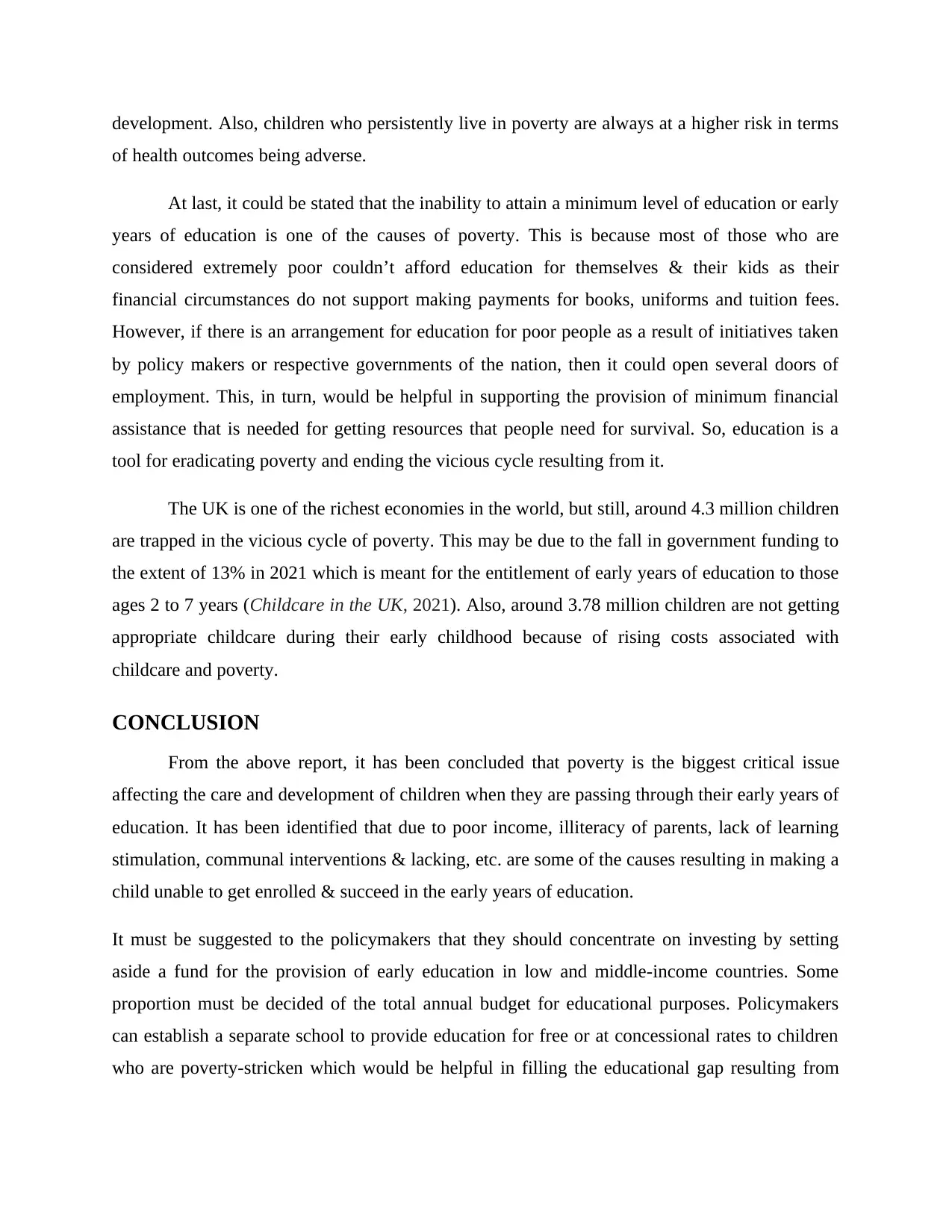
development. Also, children who persistently live in poverty are always at a higher risk in terms
of health outcomes being adverse.
At last, it could be stated that the inability to attain a minimum level of education or early
years of education is one of the causes of poverty. This is because most of those who are
considered extremely poor couldn’t afford education for themselves & their kids as their
financial circumstances do not support making payments for books, uniforms and tuition fees.
However, if there is an arrangement for education for poor people as a result of initiatives taken
by policy makers or respective governments of the nation, then it could open several doors of
employment. This, in turn, would be helpful in supporting the provision of minimum financial
assistance that is needed for getting resources that people need for survival. So, education is a
tool for eradicating poverty and ending the vicious cycle resulting from it.
The UK is one of the richest economies in the world, but still, around 4.3 million children
are trapped in the vicious cycle of poverty. This may be due to the fall in government funding to
the extent of 13% in 2021 which is meant for the entitlement of early years of education to those
ages 2 to 7 years (Childcare in the UK, 2021). Also, around 3.78 million children are not getting
appropriate childcare during their early childhood because of rising costs associated with
childcare and poverty.
CONCLUSION
From the above report, it has been concluded that poverty is the biggest critical issue
affecting the care and development of children when they are passing through their early years of
education. It has been identified that due to poor income, illiteracy of parents, lack of learning
stimulation, communal interventions & lacking, etc. are some of the causes resulting in making a
child unable to get enrolled & succeed in the early years of education.
It must be suggested to the policymakers that they should concentrate on investing by setting
aside a fund for the provision of early education in low and middle-income countries. Some
proportion must be decided of the total annual budget for educational purposes. Policymakers
can establish a separate school to provide education for free or at concessional rates to children
who are poverty-stricken which would be helpful in filling the educational gap resulting from
of health outcomes being adverse.
At last, it could be stated that the inability to attain a minimum level of education or early
years of education is one of the causes of poverty. This is because most of those who are
considered extremely poor couldn’t afford education for themselves & their kids as their
financial circumstances do not support making payments for books, uniforms and tuition fees.
However, if there is an arrangement for education for poor people as a result of initiatives taken
by policy makers or respective governments of the nation, then it could open several doors of
employment. This, in turn, would be helpful in supporting the provision of minimum financial
assistance that is needed for getting resources that people need for survival. So, education is a
tool for eradicating poverty and ending the vicious cycle resulting from it.
The UK is one of the richest economies in the world, but still, around 4.3 million children
are trapped in the vicious cycle of poverty. This may be due to the fall in government funding to
the extent of 13% in 2021 which is meant for the entitlement of early years of education to those
ages 2 to 7 years (Childcare in the UK, 2021). Also, around 3.78 million children are not getting
appropriate childcare during their early childhood because of rising costs associated with
childcare and poverty.
CONCLUSION
From the above report, it has been concluded that poverty is the biggest critical issue
affecting the care and development of children when they are passing through their early years of
education. It has been identified that due to poor income, illiteracy of parents, lack of learning
stimulation, communal interventions & lacking, etc. are some of the causes resulting in making a
child unable to get enrolled & succeed in the early years of education.
It must be suggested to the policymakers that they should concentrate on investing by setting
aside a fund for the provision of early education in low and middle-income countries. Some
proportion must be decided of the total annual budget for educational purposes. Policymakers
can establish a separate school to provide education for free or at concessional rates to children
who are poverty-stricken which would be helpful in filling the educational gap resulting from
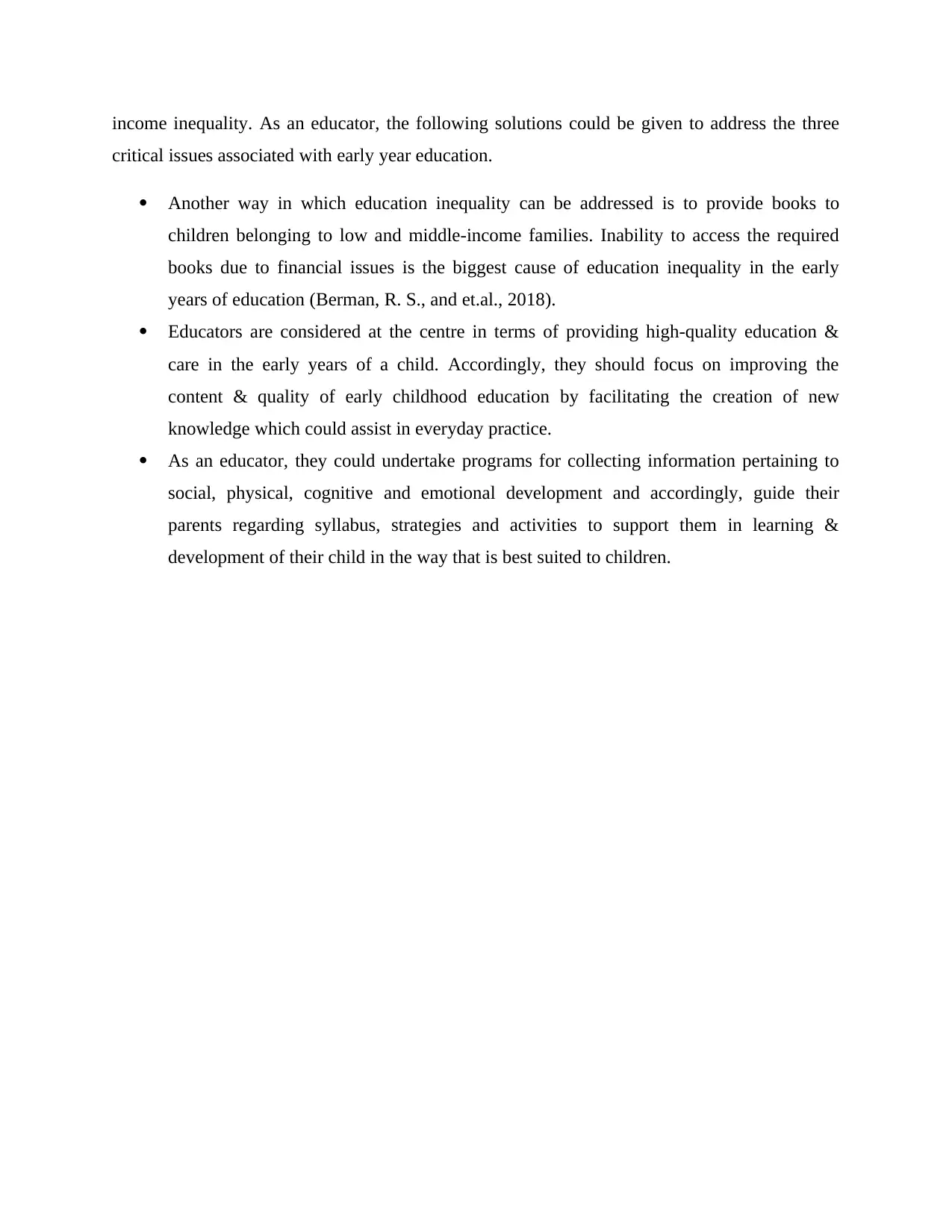
income inequality. As an educator, the following solutions could be given to address the three
critical issues associated with early year education.
Another way in which education inequality can be addressed is to provide books to
children belonging to low and middle-income families. Inability to access the required
books due to financial issues is the biggest cause of education inequality in the early
years of education (Berman, R. S., and et.al., 2018).
Educators are considered at the centre in terms of providing high-quality education &
care in the early years of a child. Accordingly, they should focus on improving the
content & quality of early childhood education by facilitating the creation of new
knowledge which could assist in everyday practice.
As an educator, they could undertake programs for collecting information pertaining to
social, physical, cognitive and emotional development and accordingly, guide their
parents regarding syllabus, strategies and activities to support them in learning &
development of their child in the way that is best suited to children.
critical issues associated with early year education.
Another way in which education inequality can be addressed is to provide books to
children belonging to low and middle-income families. Inability to access the required
books due to financial issues is the biggest cause of education inequality in the early
years of education (Berman, R. S., and et.al., 2018).
Educators are considered at the centre in terms of providing high-quality education &
care in the early years of a child. Accordingly, they should focus on improving the
content & quality of early childhood education by facilitating the creation of new
knowledge which could assist in everyday practice.
As an educator, they could undertake programs for collecting information pertaining to
social, physical, cognitive and emotional development and accordingly, guide their
parents regarding syllabus, strategies and activities to support them in learning &
development of their child in the way that is best suited to children.
Secure Best Marks with AI Grader
Need help grading? Try our AI Grader for instant feedback on your assignments.
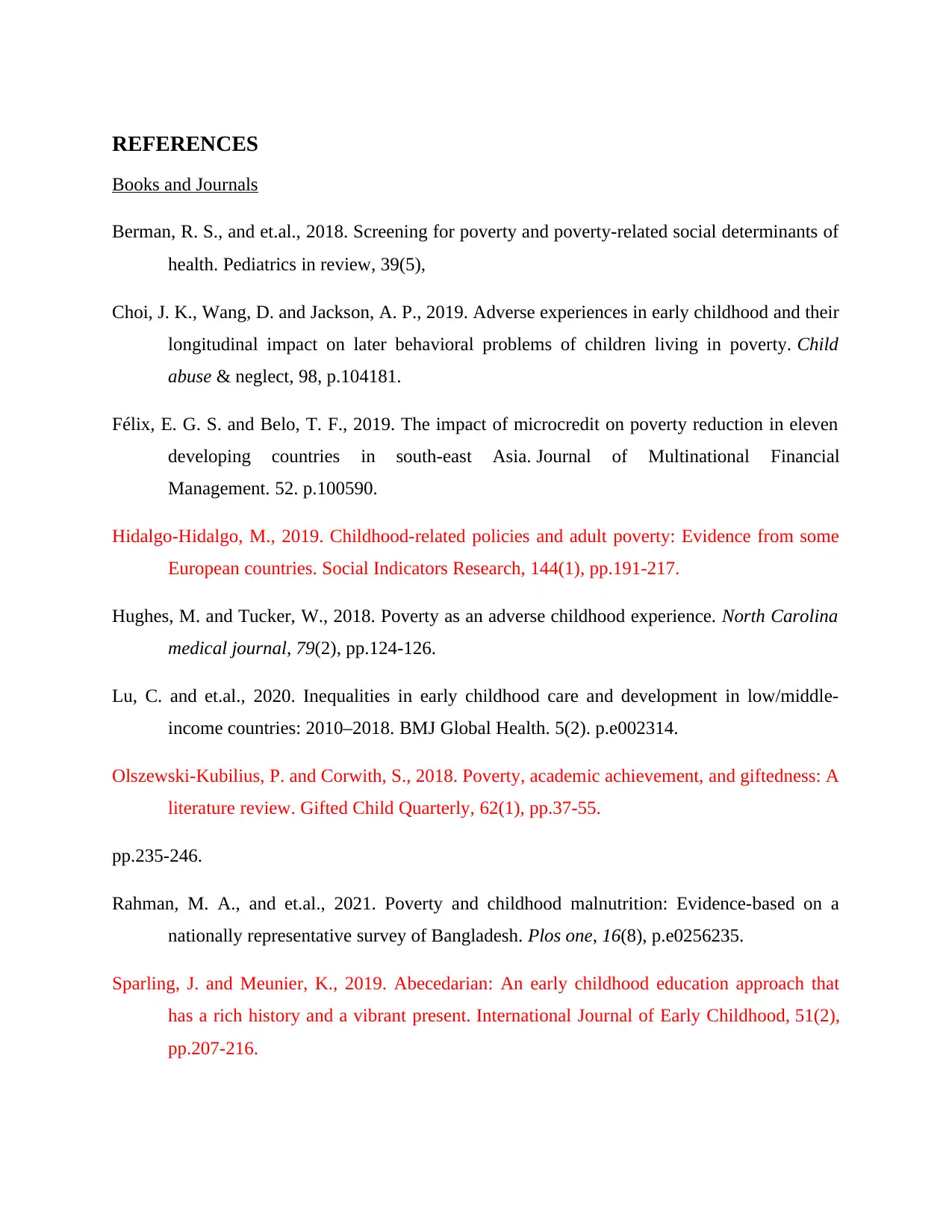
REFERENCES
Books and Journals
Berman, R. S., and et.al., 2018. Screening for poverty and poverty-related social determinants of
health. Pediatrics in review, 39(5),
Choi, J. K., Wang, D. and Jackson, A. P., 2019. Adverse experiences in early childhood and their
longitudinal impact on later behavioral problems of children living in poverty. Child
abuse & neglect, 98, p.104181.
Félix, E. G. S. and Belo, T. F., 2019. The impact of microcredit on poverty reduction in eleven
developing countries in south-east Asia. Journal of Multinational Financial
Management. 52. p.100590.
Hidalgo-Hidalgo, M., 2019. Childhood-related policies and adult poverty: Evidence from some
European countries. Social Indicators Research, 144(1), pp.191-217.
Hughes, M. and Tucker, W., 2018. Poverty as an adverse childhood experience. North Carolina
medical journal, 79(2), pp.124-126.
Lu, C. and et.al., 2020. Inequalities in early childhood care and development in low/middle-
income countries: 2010–2018. BMJ Global Health. 5(2). p.e002314.
Olszewski-Kubilius, P. and Corwith, S., 2018. Poverty, academic achievement, and giftedness: A
literature review. Gifted Child Quarterly, 62(1), pp.37-55.
pp.235-246.
Rahman, M. A., and et.al., 2021. Poverty and childhood malnutrition: Evidence-based on a
nationally representative survey of Bangladesh. Plos one, 16(8), p.e0256235.
Sparling, J. and Meunier, K., 2019. Abecedarian: An early childhood education approach that
has a rich history and a vibrant present. International Journal of Early Childhood, 51(2),
pp.207-216.
Books and Journals
Berman, R. S., and et.al., 2018. Screening for poverty and poverty-related social determinants of
health. Pediatrics in review, 39(5),
Choi, J. K., Wang, D. and Jackson, A. P., 2019. Adverse experiences in early childhood and their
longitudinal impact on later behavioral problems of children living in poverty. Child
abuse & neglect, 98, p.104181.
Félix, E. G. S. and Belo, T. F., 2019. The impact of microcredit on poverty reduction in eleven
developing countries in south-east Asia. Journal of Multinational Financial
Management. 52. p.100590.
Hidalgo-Hidalgo, M., 2019. Childhood-related policies and adult poverty: Evidence from some
European countries. Social Indicators Research, 144(1), pp.191-217.
Hughes, M. and Tucker, W., 2018. Poverty as an adverse childhood experience. North Carolina
medical journal, 79(2), pp.124-126.
Lu, C. and et.al., 2020. Inequalities in early childhood care and development in low/middle-
income countries: 2010–2018. BMJ Global Health. 5(2). p.e002314.
Olszewski-Kubilius, P. and Corwith, S., 2018. Poverty, academic achievement, and giftedness: A
literature review. Gifted Child Quarterly, 62(1), pp.37-55.
pp.235-246.
Rahman, M. A., and et.al., 2021. Poverty and childhood malnutrition: Evidence-based on a
nationally representative survey of Bangladesh. Plos one, 16(8), p.e0256235.
Sparling, J. and Meunier, K., 2019. Abecedarian: An early childhood education approach that
has a rich history and a vibrant present. International Journal of Early Childhood, 51(2),
pp.207-216.
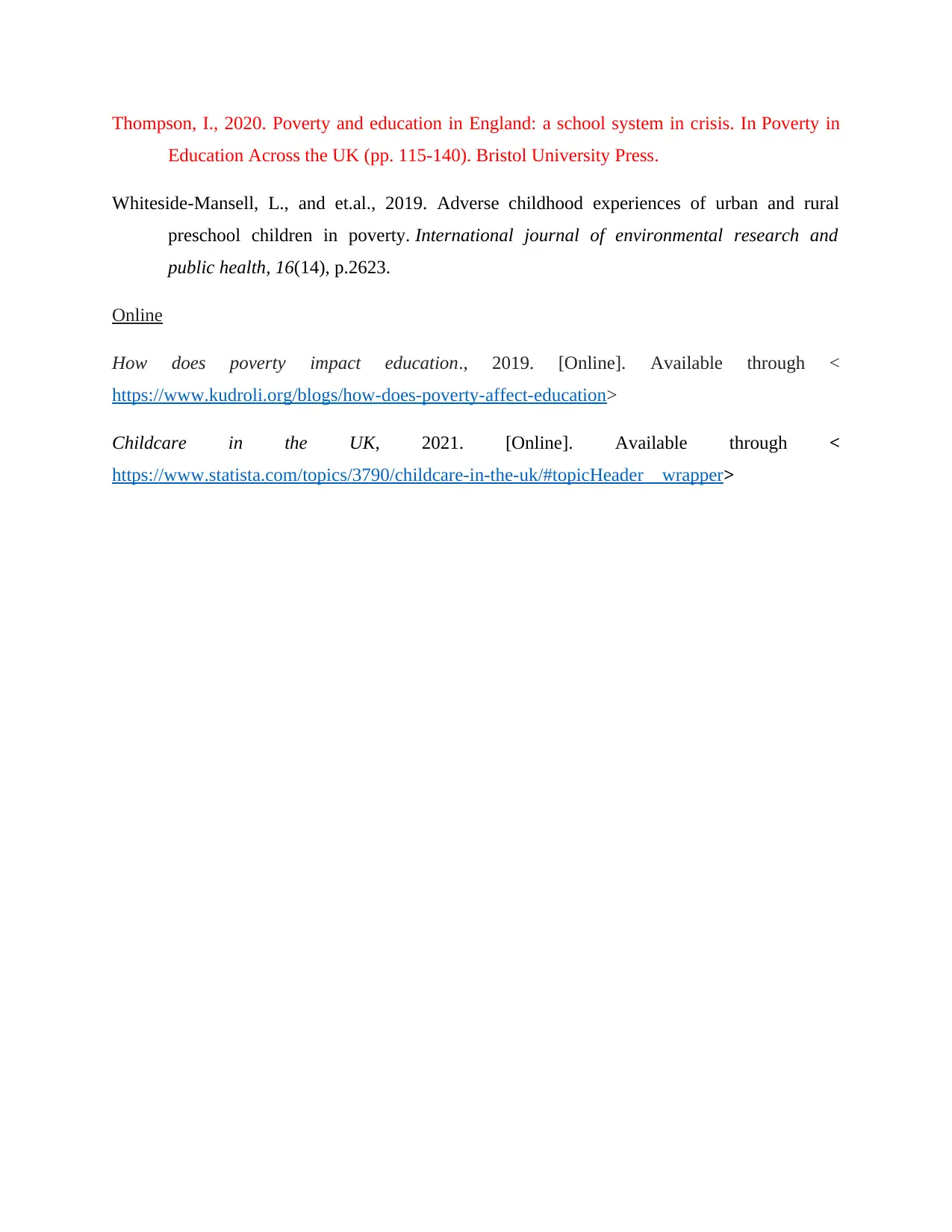
Thompson, I., 2020. Poverty and education in England: a school system in crisis. In Poverty in
Education Across the UK (pp. 115-140). Bristol University Press.
Whiteside-Mansell, L., and et.al., 2019. Adverse childhood experiences of urban and rural
preschool children in poverty. International journal of environmental research and
public health, 16(14), p.2623.
Online
How does poverty impact education., 2019. [Online]. Available through <
https://www.kudroli.org/blogs/how-does-poverty-affect-education>
Childcare in the UK, 2021. [Online]. Available through <
https://www.statista.com/topics/3790/childcare-in-the-uk/#topicHeader__wrapper>
Education Across the UK (pp. 115-140). Bristol University Press.
Whiteside-Mansell, L., and et.al., 2019. Adverse childhood experiences of urban and rural
preschool children in poverty. International journal of environmental research and
public health, 16(14), p.2623.
Online
How does poverty impact education., 2019. [Online]. Available through <
https://www.kudroli.org/blogs/how-does-poverty-affect-education>
Childcare in the UK, 2021. [Online]. Available through <
https://www.statista.com/topics/3790/childcare-in-the-uk/#topicHeader__wrapper>
1 out of 12
Related Documents
Your All-in-One AI-Powered Toolkit for Academic Success.
+13062052269
info@desklib.com
Available 24*7 on WhatsApp / Email
![[object Object]](/_next/static/media/star-bottom.7253800d.svg)
Unlock your academic potential
© 2024 | Zucol Services PVT LTD | All rights reserved.





